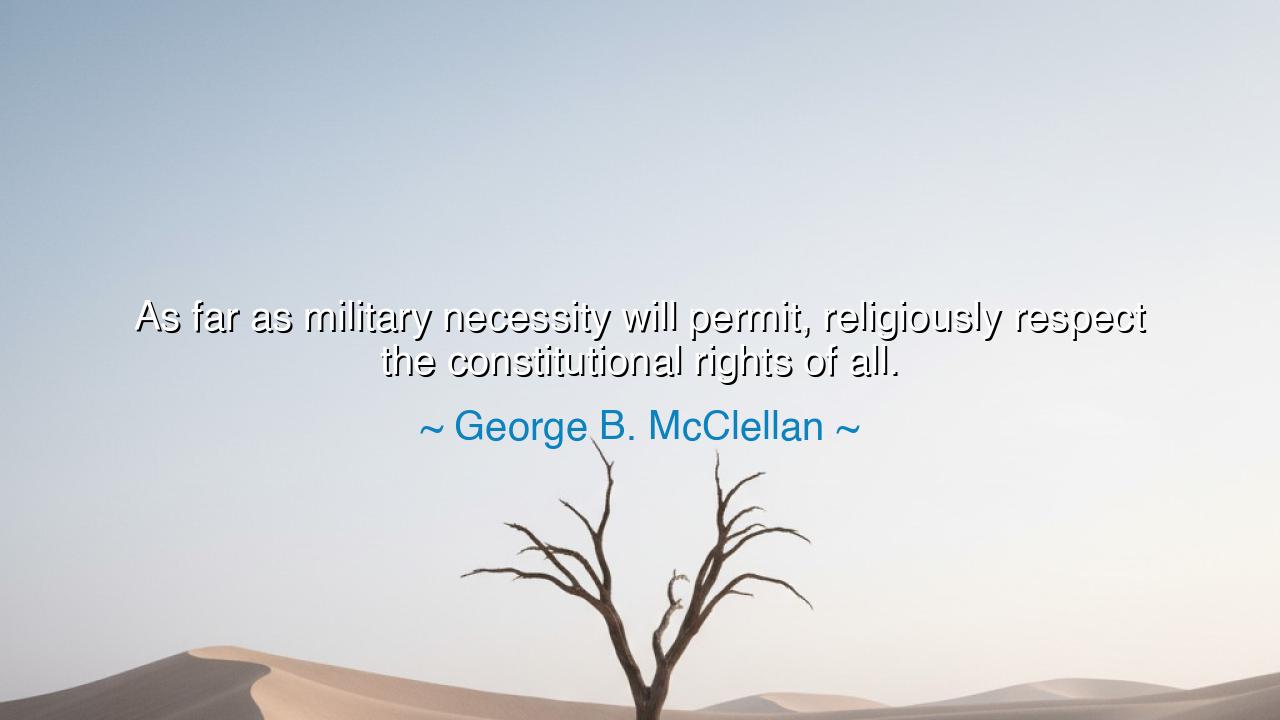
As far as military necessity will permit, religiously respect the
As far as military necessity will permit, religiously respect the constitutional rights of all.






Hear now the words of George B. McClellan, spoken in the tempest of civil war: “As far as military necessity will permit, religiously respect the constitutional rights of all.” In this command there lies a truth as sharp as a double-edged sword, for it recognizes the tension between war and liberty, between the demands of survival and the sacred covenant of a free people. McClellan, though a soldier, knew that the strength of a nation is not measured only in arms, but in its fidelity to the constitutional rights that form its soul.
The meaning of this utterance is profound. McClellan does not deny that war may sometimes demand sacrifice, that armies may require harsh measures to endure. Yet he insists that such measures must be bounded, that even amid necessity there must remain a reverence—religious respect—for the liberties of the people. To fight without restraint is to win a battle but lose the very cause for which one fights. To uphold rights, even in hardship, is to ensure that victory brings not only safety but justice.
The origin of these words lies in the crucible of the American Civil War, when the nation tore itself in two and every principle was tested by fire. McClellan, as a general of the Union, was charged with both defeating rebellion and preserving the republic. He understood that war, if unchecked, could devour the freedoms it was meant to defend. His words were both an order to his troops and a warning to history: let not necessity become an excuse for tyranny, for once liberty is broken in war, it may not return in peace.
History provides shining examples of this struggle. Consider the life of Abraham Lincoln, who in that same war wielded powers of necessity, suspending habeas corpus in times of crisis. Yet Lincoln, like McClellan, always bore the weight of the Constitution in his conscience. He acted not in scorn of liberty, but in sorrow, believing it the only way to preserve the Union. And when the war ended, he sought reconciliation, not vengeance, ensuring that the nation’s principles might endure beyond the battlefield. In such stories we see the eternal dance between necessity and freedom, restraint and survival.
The emotional force of McClellan’s command lies in its insistence on balance. He knew well that armies march faster when unshackled by law, that commanders rule more easily when unbound by rights. Yet he also knew that such ease leads to ruin. A republic is not preserved by trampling its citizens, but by guarding their dignity, even when swords are drawn. His appeal to “religiously respect” rights elevates them to sacred duty, above the whims of power, binding soldiers to the higher law of justice.
The lesson for us is clear: in every age, whether in war or in peace, necessity will tempt us to abandon principle. Leaders may claim urgency, crises may cry out for swifter measures, and fear may whisper that liberty is too costly. But McClellan’s words remind us that rights abandoned in hardship are rarely regained in ease. To respect the constitutional rights of all is not weakness but strength, for it proves that justice is greater than force, and that freedom endures even when tested by fire.
Therefore, let your actions reflect this wisdom. In your leadership, do not sacrifice principle for convenience. In your citizenship, guard against those who invoke necessity to strip away liberty. And in your daily dealings, remember that to respect the rights of others is not a burden but a sacred trust, the very foundation of community and peace.
And so, carry forward the command of McClellan: respect rights as far as necessity will permit, and no further. For a nation that holds to this balance shall emerge from trial not broken, but strengthened, its freedom preserved for generations yet unborn.






AAdministratorAdministrator
Welcome, honored guests. Please leave a comment, we will respond soon